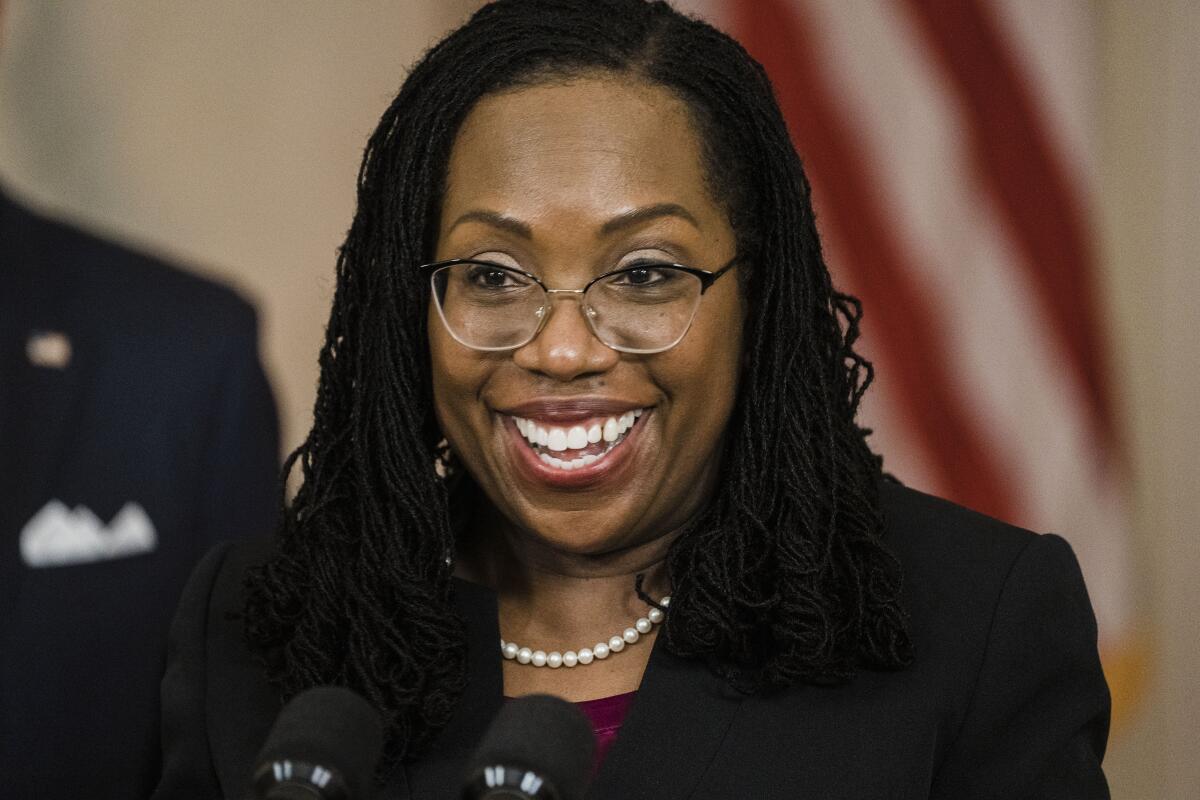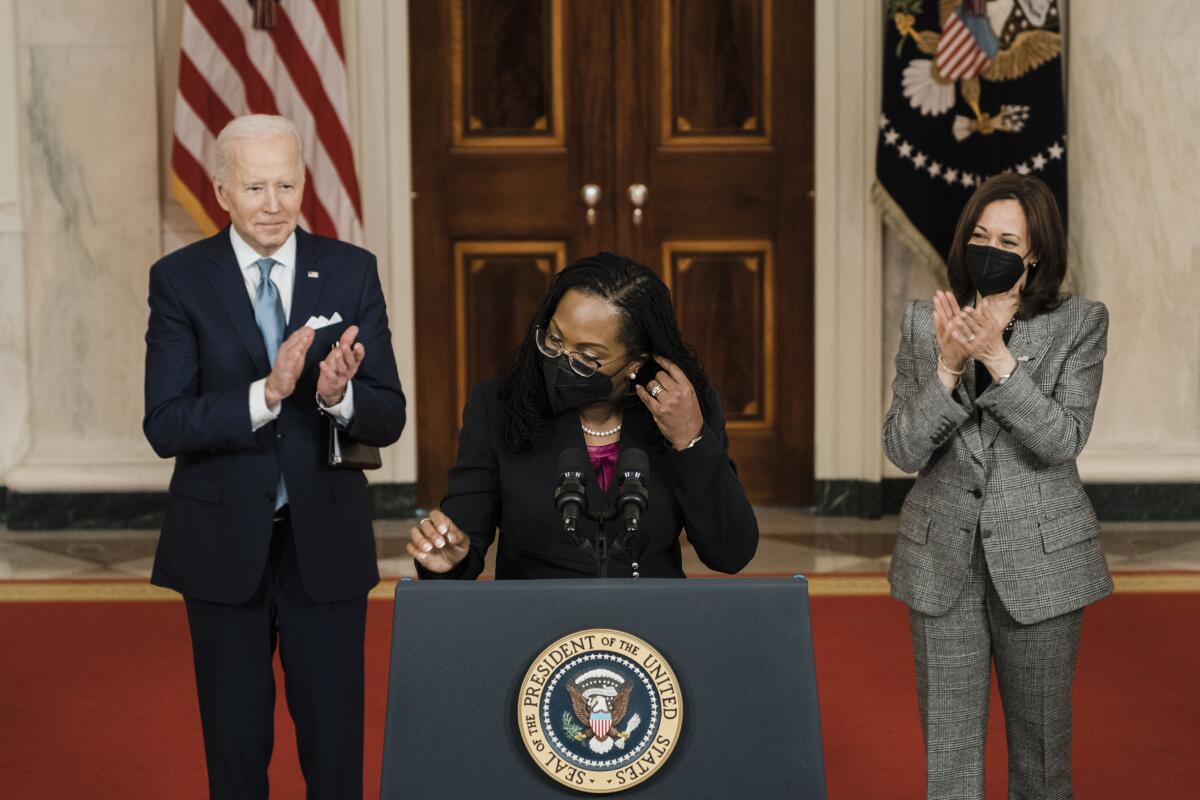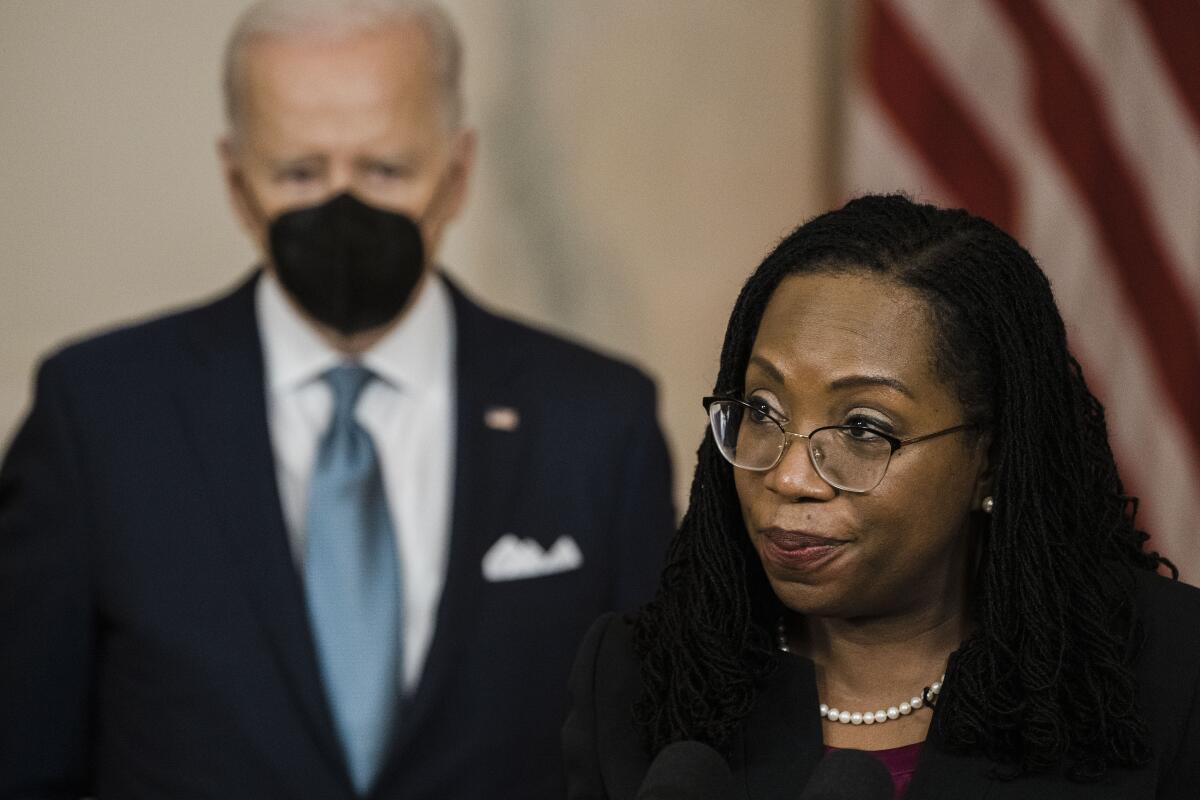Biden nominates Judge Ketanji Brown Jackson to Supreme Court in historic pick

- Share via
WASHINGTON — President Biden on Friday nominated Judge Ketanji Brown Jackson to the Supreme Court in a historic choice that could make her the first Black woman to ascend to the nation’s highest court.
“For too long, our government and our courts haven’t looked like America,” the president said Friday, announcing the nomination at the White House alongside Jackson and Vice President Kamala Harris.
Jackson, 51, a U.S. appeals court judge for the District of Columbia, had been the front-runner for the Supreme Court seat ever since Justice Stephen G. Breyer, 83, announced last month that he would retire at the end of the current term.
The court has had only two Black justices: Thurgood Marshall, a civil rights pioneer and leading liberal, served from 1967 to 1991. He was replaced by Justice Clarence Thomas, who has been the court’s most conservative jurist since then.

Jackson’s appointment could add a strong progressive voice to the court for decades to come, but it would not alter the current ideological balance of the nine-person bench, which now has a strong conservative majority of six Republican-appointed justices.
Jackson served eight years as a federal district judge handling trials in Washington before being confirmed last year to the U.S. Court of Appeals by a vote of 53 to 44, receiving three Republican votes.
That bipartisan support is expected to help ease her confirmation in a Senate currently split 50-50, with Harris giving Democrats a tiebreaking vote as needed.
Republicans voiced skepticism Friday about Jackson, calling her a favorite of the far left. But they acknowledged that Democrats likely have the votes to confirm her.
The appeals court mostly decides regulatory disputes, so Jackson does not have a track record of rulings or other writings on controversies such as abortion, guns or religion.

Since her high school days in Miami, Jackson has won friends and admirers for her intellect, character and personal warmth. She earned academic honors at Harvard College and Harvard Law School.
She has broad legal experience from serving in an array of positions, including as a federal public defender, a U.S. Sentencing Commission official and a law clerk at three courts, including for Breyer at the Supreme Court.
In her remarks at the White House, Jackson focused on her family and faith. She said her parents, who began their careers as schoolteachers in Miami, have been married for 54 years.
She said her first glimpse of the law came when her father was studying at the kitchen table to earn his law degree. He later served as chief attorney for the Miami-Dade County school board, and her mother as principal of a high school for the arts.
Jackson said her younger brother was a police detective in Baltimore who volunteered for the Army and served two tours of duty in the Mideast. Her husband is Dr. Patrick Jackson, a cancer surgeon in Washington. They have two daughters, Talia and Leila.

Jackson also paid tribute to Judge Constance Baker Motley, a civil rights lawyer who was the first Black woman appointed to be a federal judge. She noted they were born on the same day, 49 years apart.
“Today, I proudly stand on Judge Motley’s shoulders, sharing not only her birthday, but also her steadfast and courageous commitment to equal justice under law,” she said.
Progressive groups hailed her nomination.
“On the federal bench, she has shown her commitment to upholding laws that protect people with disabilities, workers, immigrants and freedom of speech,” said Ben Jealous, president of People for the American Way. “As a former public defender, she brings to the Supreme Court the perspective of someone who has seen the justice system through the eyes of our society’s most vulnerable.”
Advocates for civil rights, workers rights, gay rights and environmental protection said they were enthused by Biden’s choice.
“Her historic nomination promises an end to the erasure of Black women from our most sacred legal institutions,” said Fatima Goss Graves, president of the National Women’s Law Center.
While antiabortion advocates said they would oppose Jackson’s confirmation to the court, the president of the Center for Reproductive Rights, a leading abortion rights advocacy group, stopped short of fully endorsing her.
“Judge Jackson has not ruled on any cases that directly address abortion rights,” and her legal record “provides minimal insight” into her views, said Nancy Northup, the center’s president, saying the group would wait for Jackson’s testimony “to learn more about her views on ... reproductive healthcare.”
For decades, the divide over abortion and the Supreme Court’s 1973 ruling in Roe vs. Wade, which guaranteed the right to abortion nationwide, has loomed large in Senate battles over nominees to the court, especially when a new justice could shift the bench’s ideological balance.
It’s not clear abortion will be central to Jackson’s confirmation process, however. If confirmed, she could join the two remaining liberal justices in supporting abortion rights. But the conservative majority is widely expected to either strictly limit the right to abortion or to overturn Roe vs. Wade entirely by this summer.
However, Jackson could join the court in time to take part in two key cases involving the role of race.
The justices will decide next term whether to restrict or outlaw affirmative action policies at colleges and universities that use race as a factor in admissions. The court voted to hear challenges to the policies at Harvard and the University of North Carolina.
The court will also reconsider the use of race to draw districts that are likely to elect a Black or Latino candidate. Since the 1980s, the Voting Rights Act has been understood to require that states ensure, where possible, that racial and ethnic minorities have an equal opportunity to “elect representatives of their choice.”
Alabama’s attorney general has argued that the practice puts too much emphasis on race. The high court voted to hear his claim in the case of Merrill vs. Milligan.
In a potential preview of how Republicans plan to oppose Jackson, Senate Minority Leader Mitch McConnell (R-Ky.) described her as “the favored choice of far-left dark-money groups,” and the Republican National Committee labeled her “a radical, left-wing activist.”
Senate Democrats have countered that Jackson is extraordinarily qualified, and have pledged to pursue her confirmation in a quick, fair process.
“Once the president sends Judge Jackson’s nomination to the Senate, Senate Democrats will work to ensure a fair, timely, and expeditious process — fair to the nominee, to the Senate and to the American public,” Senate Majority Leader Charles E. Schumer (D-N.Y.) said in a statement.
Breyer has said he expects to retire when the court has handed down all of its decisions for the term, which it usually does by the end of June. Senate Democrats said they would move forward to confirm Jackson over the next month so she can be sworn in as soon as Breyer departs.
Biden had long promised to select a Black woman for the high court. Jackson was well-known and highly regarded by the Obama White House, and her name was mentioned as a possible nominee after Justice Antonin Scalia died suddenly in early 2016. That ill-fated nomination went instead to Judge Merrick Garland, whom McConnell denied even a Senate hearing.
Soon after Biden moved into the White House, Jackson was nominated for her current seat on the U.S. Court of Appeals for the District of Columbia Circuit, which has often been a steppingstone to the high court, including for Chief Justice John G. Roberts Jr. and Justices Thomas and Brett M. Kavanaugh.
Two of Biden’s other finalists for the upcoming opening were California Supreme Court Justice Leondra Kruger, 45, and Judge J. Michelle Childs, 55, of the U.S. District Court in South Carolina.
More to Read
Get the L.A. Times Politics newsletter
Deeply reported insights into legislation, politics and policy from Sacramento, Washington and beyond. In your inbox twice per week.
You may occasionally receive promotional content from the Los Angeles Times.












